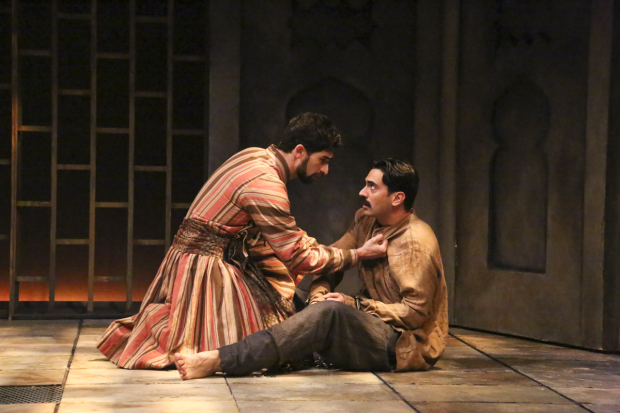Guards at the Taj
An “odd couple” of imperial guards considers the cost of beauty at the dawn of history in Rajiv Joseph’s two-hander.

(© Michael Lamont)
When you set sail on a journey with playwright Rajiv Joseph, you can expect turbulence, mind-blowing questions, the grimmest of humor, and the certainty of uncertainty. We don't know where this ship is heading or how it will arrive, but whatever cockeyed star Joseph is following, theatergoers should want to board that vessel. So it goes with Guards at the Taj, which, in its Los Angeles premiere at the Geffen Playhouse, demonstrates that the playwright's Bengal Tiger at the Baghdad Zoo was no fluke. Directed by frequent Joseph collaborator Giovanna Sardelli, this tale of two regular-guy imperial guards in 17th-century Agra is as intellectually satisfying as it is disquieting.
Friends since boyhood, Humayun (played by Raffi Barsoumian) and Babur (Ramiz Monsef) are two imperial guards who have been enlisted to stand outside the walls and protect the newly completed, but still hidden Taj Mahal. They are not allowed to turn around and even glance at the structure. In fact, no one is permitted to look at the Taj except the 20,000 masons, laborers, and slaves who built it — that's by royal decree of the emperor.
Royal decrees are perfectly fine by Humayun, a rule-follower who is looking to advance his position, but Babur is more of a daydreamer who is also apt to ask the type of questions that Humayun finds politically threatening. Since the two men are standing unobserved for hours in the middle of the night, they inevitably end up talking and arguing about – among other things – the wisdom of authority and the nature of beauty.
At dawn on this particular day when the Taj is unveiled, it becomes the most beautiful structure in the world, and the emperor who commissioned its construction does not want its beauty ever to be rivaled. Accordingly, the emperor has taken some rather extreme measures to protect the building. And this means that Humayun and Babur's job descriptions are about to change rather drastically. Joseph has set his play in Mughal India, but Humayun and Babur speak as though they have wandered in from a present-day sitcom with corresponding speech patterns and mannerisms. Despite this, lines like "Oh, c'mon man" and "God, you overact" never feel jarring.
Staged in the Geffen Playhouse's intimate Audrey Skirball Kenis Theater, Sardelli's production places its two actors in front of a plain stone wall with some strategic lights. Like most of Shah Jahan's India, we in the audience don't get to see the Taj either, but when Humayan and Barbur sneak a peek, a lighting effect by designer Lap Chi Chu makes that climactic moment positively biblical. After that "first light" revelation, things get very dark very quickly. Our heroes end up at their next assignment, rendered in grizzly glory by scenic designer Tom Buderwitz.
Whether they are playing scenes of intense drama or quirky comedy (and Guards contains both), Barsoumian and Monsef's comic interplay is superb, particularly in the opening scene as Monsef's puppy-dog-like Barbur breaks down all of his old friend's defenses. "In silence, we are vigilant," Humayan says. "Swearing an Oath to Not Speak," returns Barbur. "Contradiction!" When they are dreaming up futuristic inventions (Humayun's is a portable hole), the two actors draw serious laughs.
The drawing room banter eventually gives way to far more weighty affairs and the actors are on equally solid footing when this happens. Monsef, who was so effective establishing Barbur as a clown, taps the character's complexities with equal skill. Barsoumian, meanwhile, takes Humayan far past the character's fixation with obedience. If Guards at the Taj is destined for multiple regional stagings, some enterprising director will undoubtedly create a production in which his two actors alternate roles.
But that's the future. At the Geffen, Barsoumian and Monsef are the perfectly cast co-captains of Rajiv Joseph's voyage from the dark possibilities of the human spirit and back out into the light.








